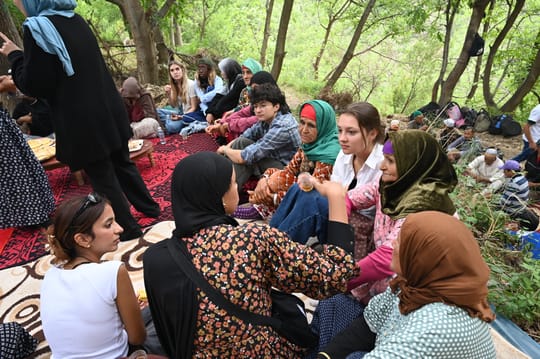The Impact of the High Atlas Foundation and Volunteerism

Volunteerism in Morocco is a multifaceted opportunity for individuals seeking to engage in meaningful ways of service. The unique aspects of culture that Morocco provides make it an enriching environment for volunteer work. The High Atlas Foundation (HAF), based in Marrakech, embodies the principles of effective volunteerism in Morocco, as they effectively address socio-economic challenges and foster sustainable development in the communities they aid. The contributions of volunteers from this organization not only enhance community well-being throughout the country but also work to create a more equitable global society. Founded by Yossef Ben-Meir and former Peace Corps volunteers in 2000, HAF promotes sustainable development in Morocco. The High Atlas Foundation’s forefront efforts is to be involved in community-driven projects and ensuring that all local needs are met.
A significant aspect of HAF’s work focuses on agricultural development. The foundation, in collaboration with local farmers throughout Morocco, established nurseries for fruit trees and other essential plants in hopes of enhancing food security and promoting economic stability. By cultivating trees composed of figs and olives, HAF empowers local farmers to generate agricultural practices that are diverse to generate sustainable income. Selling fruits provides a reliable source of profit, thereby improving the growth of finances within rural communities. For instance, HAF implements a Farmer to Farmer (F2F) program that is aimed at fostering agricultural innovation and community empowerment. A standout example of this initiative's success is Tamasout, a farming cooperative in the Zaouia Nahliya Village. Founded in 2020, a committed group of seven volunteers contributed to fostering economic development among small-scale farmers within the village.
Volunteers with HAF are also actively involved in initiatives aimed at empowering women in Moroccan communities. HAF empowers women across various Moroccan backgrounds, equipping them with resources needed to achieve economic independence and social mobility. HAF’s women’s empowerment initiatives focus on building leadership skills and promoting active participation in community development.
The IMAGINE program, launched in 2016, is one of the several programs empowering Morocco’s working women through workshops and organized initiatives throughout the country. The four-day program offers a setting for women to voice their opinions, take on leadership roles, and assert themselves in both personal and professional settings. IMAGINE creates a supportive network where women can connect with like-minded individuals, fostering collaboration and mutual support. Peer support within IMAGINE helped immensely with overcoming personal challenges as well as building resilience as women in male-dominated spaces.
Environmental conservation is at the core of HAF’s mission, as they deal with challenges ranging from water scarcity and implementing renewable energy sources. Measures taken from HAF volunteers are proactive at regressing the impacts of climate change and protecting Morocco’s natural environment for future generations. However, HAF’s environmental initiatives go beyond technical solutions to implement sustainability within local communities. HAF facilitates inclusion of those in marginalized communities, by involving community members in decision-making processes and project implementation.
The environmental sector of volunteerism ensures that conservation of their land is locally driven and sustainable in the long term. Involving volunteers in environmental conservation efforts, such as those led by the High Atlas Foundation, is vital because they’re fostering community engagement and empowerment by involving local residents. This inclusive approach creates trusts and empowers communities to take the lead of their own environmental conservation efforts. HAF volunteers are simply just catalysts for inspiring collective action and promoting a sense of community around environmental sustainability.
Whether through the High Atlas Foundation or other organizations, volunteerism addresses global challenges and fosters community development. Those seeking to be involved in an experience that focuses on community well-being and personal enrichment, volunteering presents itself as a once-in-a-lifetime opportunity to grasp these two vital aspects. Volunteers provide diverse perspectives, experiences, and resources to communities that are otherwise inaccessible. Volunteers often return from their experiences with a renewed sense of purpose and a deeper understanding of the missions that they wish to achieve in the communities that they serve.
Thus, volunteerism serves as a catalyst for community empowerment, promoting sustainable practices, and mobilizing resources to marginalized environments. Volunteers throughout the world bring diverse experiences, skills and knowledge to support the local initiatives that they serve. Their advocacy raises awareness and drives support for community needs, leading to policy change, increased funding and greater support for that marginalized group. The sustainable practices implemented by volunteers guarantee long-lasting preservation of their environment and management of the resources that are provided to these communities. Collectively, these initiatives lay the groundwork for thriving communities supplied to navigate hardships and sustain ongoing growth and development. Volunteerism is much more than a mere act of service, but an agent of enduring positive change for all communities.
Aaliyah Taylor is a student at the University of Virginia and an intern at the High Atlas Foundation in Morocco.